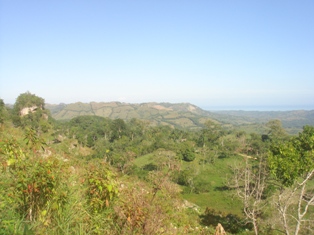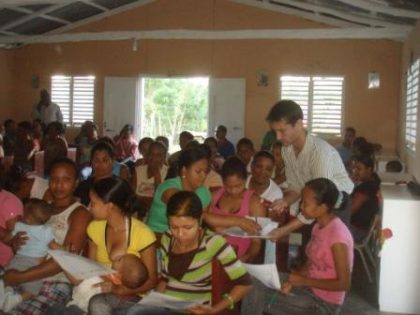Location
La Penda, Blanco Arriba Municipality, Hermanas Mirabal Province, Dominican Republic
Community Description
Located in the Cordillera Septentrional mountain range, La Penda is predominately a farming community consisting of 96 homes and 373 residents set along a two-mile dilapidated dirt and rock road.

The majority of houses are constructed of a three foot high concrete base with the remaining wall constructed of palm wood and a roof of zinc.
Internal commerce is limited to small stores which sell basic necessities, such as rice, beans, soap and toilet paper.
Illiteracy within the community stands at 18%, while the percentage of adults not completing a fifth grade education is 41%, with another 22% not having attained an eighth grade education.
The community is connected to the country’s electrical grid and receives electricity for 40% of the day.
Two aqueducts service the community supplying water to 73% of houses directly and 15% of houses indirectly with the remaining 12% relying on river or rainwater.
Project Description
This project is to provide 28 water filters for families in the community without access to safe water.
The project is being implemented under the direction of the La Penda Neighborhood Association and their Health Committee. Filters are being purchased through Filter Pure, a non-profit organization that through their distribution of filters supports local economies.
 Participating families initially attended 3 health-related presentations organized by the Health Committee. Upon receipt of the filters, families will attend an educational workshop which will include instructions on the simple usage and maintenance of the filter. This workshop will be coordinated by the Health Committee who received facilitator training from Filter Pure and will be a hands-on demonstration in which each family will clean their filter. The Health Committee will also conduct a follow-up visit with the families to ensure that maintenance of the filters is being completed according to schedule. When replacement ceramic pot filtration components are needed, the Health Committee will also work with each family in order to save the necessary funds.
Participating families initially attended 3 health-related presentations organized by the Health Committee. Upon receipt of the filters, families will attend an educational workshop which will include instructions on the simple usage and maintenance of the filter. This workshop will be coordinated by the Health Committee who received facilitator training from Filter Pure and will be a hands-on demonstration in which each family will clean their filter. The Health Committee will also conduct a follow-up visit with the families to ensure that maintenance of the filters is being completed according to schedule. When replacement ceramic pot filtration components are needed, the Health Committee will also work with each family in order to save the necessary funds.
The ceramic pot filter is formed from a mixture of clay, a combustible material (sawdust or rice husks), and colloidal silver. The pot is then kiln fired, leaving about half an inch of activated charcoal within the filter and burning out the combustible material thus creating micro pores (1.3 microns) coated with the silver. The pores filter out turbidity, bacteria and protozoa; and any bacteria that does pass through the pores is rendered ineffective by the colloidal silver while the activated charcoal improves the odor, taste and color of the water. The filter removes 99.99% of pathogenic bacteria and oocytes while retaining healthy, naturally-occurring minerals.
The filter, which is designed with a rim, is placed on a five gallon plastic storage bucket with a spigot at the bottom for dispensing. A lid is placed on the filter to prevent contamination. Water is poured through the ceramic pot and filtered into the receptacle bucket. The filters are capable of purifying water from any source, including aqueducts, rivers, wells and rainwater. The flow rate of the filter ranges from 20 to 30 liters per day depending upon how often the filter is refilled.
Filters are cleaned by lightly scrubbing the surface when flow rate is reduced, and it is recommended that the filter is boiled every three months to insure optimum effectiveness. The effective useful life of the ceramic pot is at least 5 years.
Project Impact
112 people will benefit from the project.
Peace Corps Volunteer Directing Project
Bob Tuttle
Comments
Clean water will result in a reduction of school and work absences due to stomach and intestinal illnesses. The educational component will ensure compliance in the use and maintenance of the filters. Sustainability is built into the project with the saving of money for the purchase of replacement components when needed.
Dollar Amount of Project
$500.00
Donations Collected to Date
$500.00
Dollar Amount Needed
$0.00 – This project has now been fully funded through the generosity of the Elmo Foundation together friends and family of Peace Corps Volunteer Bob Tuttle.
We encourage others to continue to donate using the Donate button below, and we will notify Bob of your donation. Additional funds will be used to fund the next project by him and/or those of other PCVs in the country of service.
This project has been finished. To read about the conclusion of the project, CLICK HERE.